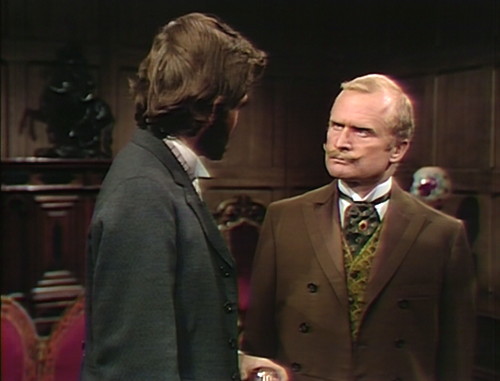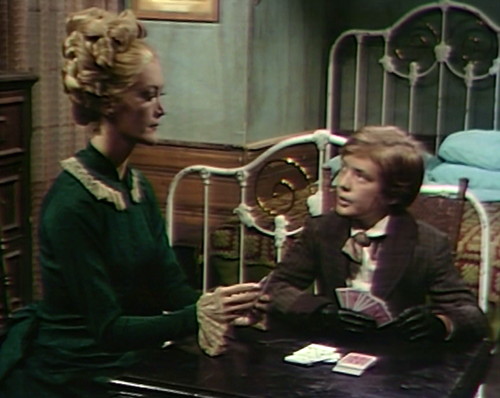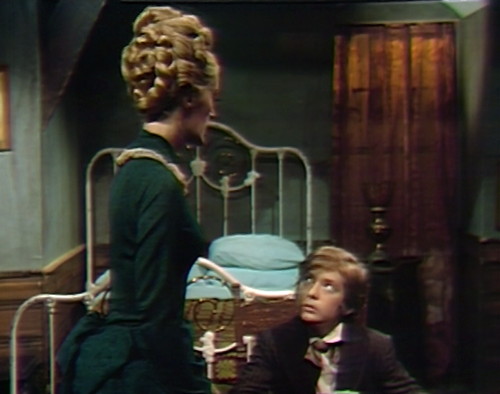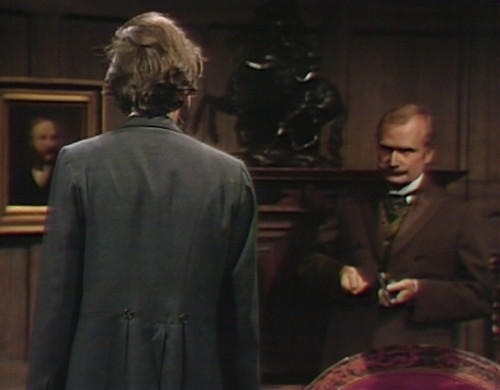“Well, of course you have a hand. There it is, see?”
Edward Collins comes home from a hard day of whatever, and finds his younger brother Quentin swilling brandy in the drawing room. Quentin says that he needs it, after what happened today.
“All right, Quentin,” Edward sighs. “What has happened this time?”
And then this is the nonsense that happens next.
Quentin: Jamison has been possessed by Count Petofi, a dangerous murderer, a man who before he left here wished us all nothing but evil!
Jamison: Before this day is through, you will know many things that you know not now.
Edward: If there is anything wrong, it’s because you and your kind have brought it here!
Jamison: Mr. Collins, I find your hospitality less than overwhelming!
Edward: No, Quentin, you turned her into a crazy woman!
Quentin: What did you think when you looked at that little boy with gypsy eyes and the Collins name?
Jamison: There’s a very good reason why I can’t take my gloves off.
Jamison: My father’s not here. That’s a peacock! A vain, and a little man! Name-proud!
Quentin: Evil spirit, possessor of that which is not thine to possess… depart! Depart, I say!
Jamison: And I say, as soon as you’re finished with all the mumbo-jumbo, would you hand me a glass of mineral water?
Quentin: You’re going to shoot me the next time I attempt to talk with Jamison, is that it?
Edward: If I did, do you think I would need six silver bullets?
Edward: I am preparing for the moment when Barnabas Collins will be destroyed. I don’t like his victims too near the house.
Jamison: He’s not a very good doctor. He examined me for nearly an hour, and didn’t notice that I only had one hand.
Edward: Well, of course you have a hand. There it is, see?
Jamison: I told you! No hand! I told you, no hand!
Tomorrow: The Other Puppeteer.
Dark Shadows bloopers to watch out for:
In the teaser, when there’s a close-up on Edward and he says, “Is the boy ill?” you can see the shadow of a camera moving in the foyer.
Edward asks Beth, “Is he running any fever?” Beth says she doesn’t know, and Edward answers, “Well, take it immediately!”
Tomorrow: The Other Puppeteer.
— Danny Horn
















David Henesy gives a terrifically chilling performance in this sequence. What a phenom.
I also love the “gypsy eyes” comment.
Yes, I’ve always liked the “gypsy eyes” line; that and all Jenny’s turmoil about passing redeem the Romany storyline for me, taking it from a simple racist story to a story where some people start to see how racism hurts people.
I’ve commented before that DARK SHADOWS (sort of like the TWILIGHT ZONE in its way) was able to directly address racism during 1897 with the treatment of gypsies in a manner it never could during the modern day with black people or Jews.
Edward can declare “You married a gypsy!” in disgust, which is great commentary on the view many had on interracial relationships, but Roger could have never said the same to Carolyn if she brought home a black guy. TV of this period either erased minorities or behaved as if racial harmony was the norm. And this was not just one-sided: In 1897, not only can we see characters we’re meant to otherwise like (Judith, Edward, Quentin, Barnabas) exhibit casual racism (“We don’t have time for you gypsy feelings!”) but we can also see the “minority stand ins” reflect their own contempt for their “social betters.” That was far more revolutionary, I’d argue, as usually on TV (and arguably still today) minorities (gays, blacks, Jews) are depicted with the patience of Jackie Robinson — never responding in kind and always willing to selflessly lead the “misguided bigot” to his or her better nature.
Rod Serling was able to address contemporary issues by expressing them through a veil of fantasy: as he once commented, “I found that it was all right to have Martians saying things Democrats and Republicans could never say.” Before that, he had more leeway as part of Studio One, in the days when, despite conservative censors, the new medium known as television, at least with Studio One, really did try its best to put across messages of substance, that is, until the end of the 1950s when a change in network executive leadership altered the status quo from that of social issues addressed in a more direct way to the bottom line of entertainment, thus beginning the “dumbing down” process of the “lowest common denominator” that has persisted into the present day.
Dark Shadows could safely address such ethnic tensions from the previous century because they would not be contemporary enough in 1969 to provoke the audience. Other shows of the time, well in advance of Norman Lear and his All In The Family, were doing a more effective job of highlighting race relations, such as That Girl, which depicted racial mixtures in social relationships in a favorable, if somewhat subtle, way, but especially the Christmas 1970 episode of Bewitched (Sisters At Heart), which addressed racial relations explicitly in a way that had never before been attempted on television.
But I really think it is one of Dark Shadows’ strengths that they did not go there in present day Collinsport or Collinwood, because it is precisely that aspect of the show that makes it so easy for modern day viewers to immerse themselves in that world: It is a microcosm unto itself. The outside world of the 1960s doesn’t even really exist. Nobody mentions the Beatles (the only reference is in a pre-Barnabas episode where in the Blue Whale a Muzak version of Yesterday is played on the jukebox), race riots, the Moon landing, or even Vietnam, the latter of which would have crept in very early. Take young Joe Haskell–and the military would have taken him for sure. A working class kid from a small town with no ambition for college; in 1966 he would have been facing the draft board faster than you could say “Bill Malloy is dead.”
Dark Shadows has this kind of parallel reality sense that, I think, is the main reason for its enduring appeal among fans.
Interestingly enough, the one Twilight Zone episode that dealt with racism in a direct, non-fantasy way (‘The Encounter’ co-starring George Takei) was pulled from the syndication package after its original airing in 1964. Further proof that networks/audiences of the time were more comfortable with the topic in a sci-fi and removed setting.
Absolutely- in fact the main chasm between horror and sci fi came with the censorship of horror in comic books. Eventually EC comics broke this pattern by exiting the AA code and finally overturning it’s power when they released a sci fi comic within code starring a black astronaut. The censorship board’s attempt to block the comic despite a lack of content falling under the code eventually enraged the comics community so much that they all began defying the code.
This is an episode I’ve been waiting for. David Henesy is amazing here, giving what might be his greatest performance. Deeply chilling and very creepy, he plays Petofi brilliantly.
I love this episode- it gives David Henesy so much more to play with- and the dialog is such fun. Quentin also takes on some new dimension.
David was really a good actor on occasion… The early episodes when he’s a monster brat, the first Laura storyline, the Mr. Juggins episodes… And here too.
I haven’t seen it in a very long while, but I also remember David being great in it.
I think of this every time I read about a big angry Quentin and Edward scene, and I’ve already mentioned it recently, but there’s a moment between them that always stays with me. When Edward tells Quentin he’s had too much brandy and Quentin tells him he ISN’T drunk, Edward says “Well, opium, then.”
As I said before, Louis Edmonds made it sound like such a “throwaway” line. In spite of the “brandy swilling” mentioned at the top of the page, could this by any chance be that episode?
Yes, Edward says something like, “What is it this time? Brandy? Opium?”
The line about the hospitality being less than overwhelming, one of my favorite David Henesy lines.
Perhaps he does so well here playing the adult role of Petofi because as an actor Henesy spent so much time around adults, probably in those years more so and more often than kids his own age.
Mineral water….For the digestion.
(!!!!!!)snort.
The gypsy eyes and Colins name line brought me up short because Quentin’s children were, in fact, denied the Collins name. Come to think of it, could they and their descendants have come to be the Jennings family precisely because of their mother’s name, jenny? No. This might be a writer’s game of association because presumably, Quneitn’s daughter married a man named Jennings. Maybe we will never be told.
Petofi’s trick and its resulting effect on Quentin and the rest made me reflect that if someone warns you that the truth will come out, you will be so upset about the truth coming out that you might not remember to marvel at the fact that the warning is coming true. You are too caught up in the turmoil of the truth coming out.
Much is asked of David Henesy in this episode. There are moments when he has to do a Thayer David impression. Those he carries off splendidly- “mineral water, for the digestion.”
At other moments, Petofi is tricking people into thinking that Jamison is free of his influence. That requires him not only to show the other characters a convincing likeness of Jamison, but also to show the audience the wheels turning in his devious mind. Sometimes that works- when he tricks Edward into letting him kiss him, he does create suspense as we wait to see his evil plan work itself out. Other times it doesn’t. When he tells Beth that “I just want people to like me,” he sounds so much like David Collins circa December 1966 that it just seems like he’s forgotten that he’s supposed to be possessed.
I noticed that, too. Perhaps Petofi was temporarily relinquishing his control over Jamison at times when it suited him to do so in order to beguile the adults?
David Henesy was better at playing a kid who was possessed/demonic/disturbed than he was at playing an ordinary kid. And it’s a lot of fun watching him imitate Thayer David.
David Henesy really did a fine job acting possessed. The close-ups on David were funny!
I was almost teary-eyed when Quentin confronted Edward about Quentin’s children. Especially that his son had died.
I loved the laying on of hands Quentin tried on Jamison. It reminded me of when on Bewitched last season Maurice decided to try it when turning Durwood back from being a mule.
And man does Quentin not understand personal space! He was right up on Barnabas!
Jamison’s fake hand made his arm look way longer than it should be.
quentin was not as angry as i would have been if i had never been told i had two children. that is unspeakably cruel. edward and judith were both tools
david henesy was at his best in this one. no wonder i had a crush on him when i was 11
right there with you! though I was more like 8 or 9 it was like “hey! someone for ME to relate to here!”